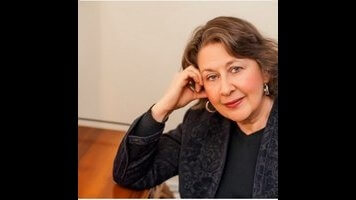Religion often tries to help people reconcile the world they live in, grounded in practical needs and desires, with the worlds they can imagine. It’s a conflict that weighs heavily on the characters of Barbara Klein Moss’ debut novel The Language Of Paradise, but also brings down the entire book. By dividing her focus between the relatable, if mundane, and the pursuit of something greater, she produces a book that spans diverse subjects but deals with them shallowly.
Set in Massachusetts during the rise of the transcendentalist movement in the 1830s, The Language Of Paradise follows Sophy, the flighty adopted daughter of a Calvinist pastor and professor, and Gideon, a theology student fascinated with linguistics. Gideon writes his thesis on ancient efforts to see what language might develop in infants cut off from speaking adults, and is persuaded by a charismatic teacher, Leander, to try the experiment using Gideon’s own son as the subject.
It’s a compelling hook, which is why it’s so disappointing that the experiment doesn’t actually happen until the last third of the book. Moss takes her time building up Sophy and Gideon’s relationship and the society they don’t quite fit into. Their first meeting, told alternately from each character’s perspective, is beautifully written, with Gideon imagining Sophy to be a wood nymph dancing in the spring flowers while she sees the sunlit blond as an angelic visitor.
While both seeing the other as an otherworldly being seems like it could be a recipe for a devoted romance, it portends the difficulties that will come of their incompatibility as Sophy longs only for a life where she can be free, creative, and loved, while Gideon is haunted by dreams of a paradise that seems just beyond his reach. They’re brought together by Sophy’s father, who sees in Gideon the perfect son-in-law, attempting to press the young man into becoming his assistant in all things theological. Gideon’s internal griping about his role as an “amanuensis” and Sophy’s father’s self-important, hypocritical ways offers a pinch of humor the otherwise heavy book could use more of.
If Moss had stuck to this plot, she could have penned a solid work of historical fiction that explores changing views on religion and the burdens of tradition. As it is, what she builds with references to the local church losing parishioners and the impact of a major recession in 1837 never develops into anything. She changes course in the third act to focus on Gideon and Leander’s efforts to recreate the Garden Of Eden by discovering the language spoken by Adam and Eve.
The result is that The Language Of Paradise feels like two books pressed into one, both left half developed. When pressed about his past, Leander confesses that he is a Jew and said that should answer all of Gideon’s questions about him. But even later revelations never provide a satisfying motivation for Leander to invest everything he has in this experiment. Some mystery can be intriguing, but Leander never gets enough development to feel like a real character, making him more an intrusive force that pushes plot and conflict.
Once she gets into the Eden business, Moss’ views on the morality of her characters seems to become as simplistic as the tale of Adam, Eve, and the serpent. She plays at taking a neutral tack, having Leander point out that he might be an interloper but that Gideon and Sophy’s marriage was already in a poor state before he arrived, while having Sophy wonder if Gideon is actually doing her a service by giving her a silent greenhouse to raise her son in rather than the years of hard labor and community service that would normally be expected of a pastor’s wife. But then Moss tosses in threats from both Leander and Gideon to make it clear where sympathies are meant to lie.
Most damning of all, Gideon ceases to be a narrating character in these later chapters, leaving his thoughts a mystery. It might be an effort to lend more weight to Sophy, who is largely devoid of agency throughout the narrative, but cutting out Gideon’s perspective as his grand experiment falls apart is a terrible missed opportunity.
Moss clearly put a lot of research into The Language Of Paradise and it’s an ambitious debut that hints at her potential as a novelist. Repeatedly, Gideon considers whether it would be enough to just be happy in a simple life with his wife and son rather than continuing to seek out divine truths. Like her character, Moss has lofty goals, but overreaches in her pursuit of greatness.


 Keep scrolling for more great stories from A.V. Club.
Keep scrolling for more great stories from A.V. Club.